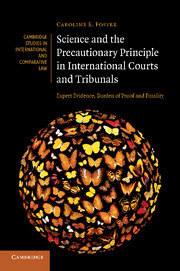 Science and the Precautionary Principle in International Courts and Tribunals
Science and the Precautionary Principle in International Courts and Tribunals Published online by Cambridge University Press: 11 April 2011
Cases involving scientific knowledge and the risk of future harm raise a host of new problems in connection with evidence, proof and the finality of adjudicatory decision-making. Indeed, international rules relating to evidence and proof in international courts and tribunals are evolving as a result of the increasingly high incidence of such disputes. Increased use is being made of different methods for the taking of expert evidence; the rules on the allocation of the burden of proof are coming under scrutiny; and the rules ensuring the finality of international adjudication require consideration. This book explores and evaluates the procedural developments that are taking place and assesses further steps to be taken, particularly with a view to recognising and accommodating the precautionary principle.
According to the precautionary principle, action to counter a serious threat to human health or the environment should not be delayed merely because of scientific uncertainty. The need to protect human life or health and the environment should be assumed, once certain thresholds are crossed. Proving that harm will occur is not required. This approach sits awkwardly with the usual precepts of adjudication, which revolve around the proof of fact. The challenge is for adjudicators to make reasoned decisions that pay due heed to the harm that is threatened in every dispute, despite the absence of perfect knowledge.
To save this book to your Kindle, first ensure [email protected] is added to your Approved Personal Document E-mail List under your Personal Document Settings on the Manage Your Content and Devices page of your Amazon account. Then enter the ‘name’ part of your Kindle email address below. Find out more about saving to your Kindle.
Note you can select to save to either the @free.kindle.com or @kindle.com variations. ‘@free.kindle.com’ emails are free but can only be saved to your device when it is connected to wi-fi. ‘@kindle.com’ emails can be delivered even when you are not connected to wi-fi, but note that service fees apply.
Find out more about the Kindle Personal Document Service.
To save content items to your account, please confirm that you agree to abide by our usage policies. If this is the first time you use this feature, you will be asked to authorise Cambridge Core to connect with your account. Find out more about saving content to Dropbox.
To save content items to your account, please confirm that you agree to abide by our usage policies. If this is the first time you use this feature, you will be asked to authorise Cambridge Core to connect with your account. Find out more about saving content to Google Drive.